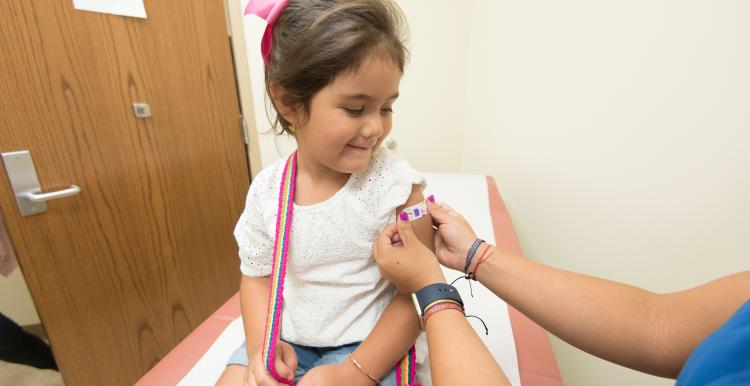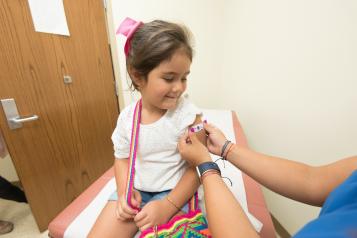Polio booster campaign for children aged 1 to 9

All children aged 1 to 9 years in London need to have a dose of polio vaccine now. For some children this may be an extra dose of polio vaccine, on top of their routine vaccinations. In other children it may just bring them up to date. The vaccine you are offered will be the right one for the age of your child.
After your child has had this extra dose, you still need to complete or catch up on the routine doses at the recommended age (or as soon as possible afterwards). Check with your GP practice.
Children aged 1 to less than 3 years and 4 months
- Your child should have already had 3 doses of polio vaccine
- Recommended in this campaign: a single polio booster vaccine – (Infanrix hexa or Vaxelis). At least 4 weeks after their last dose
Children aged 3 years 4 months to 9 years
- Your child should have already had 4 doses of polio vaccine
- Recommended in this campaign: A single polio booster vaccine – (Boostrix-IPV or Revaxis) unless they had received their pre-school booster in the past 12 months
Why your child is being offered a polio booster
Since February 2022, we have found a type 2 polio virus in sewage samples taken from north London. This suggests that the virus is now spreading between people. This has probably happened because vaccine uptake for the infant and toddler vaccinations in London is lower than it should be.
By giving an extra polio vaccine dose we aim to boost each child’s protection, starting with the areas of London where the virus has been detected. Boosting immunity in those who are already vaccinated should also help to reduce the risk of the virus continuing to spread.
How your child can get the polio booster
The NHS will contact you to ask you to book an appointment for your child’s polio vaccine.
Those who cannot have the vaccine
There are very few reasons why children cannot receive the polio vaccine. If your child had a serious allergic reaction to a previous vaccination or to certain uncommon antibiotics (neomycin, polymyxin or streptomycin) you may want to check with your doctor.
Which vaccine will your child be offered
We are using 3 different types of vaccines that all provide excellent protection against polio – they are already used in the routine programme and safely given to millions of children each year.
The only difference between the 3 vaccines is the other infections that they protect against. They all provide protection against polio, tetanus and diphtheria, but some may also top up protection against whooping cough and hepatitis B. It does not matter which of the 3 vaccines your child gets, unless they have missed out on some earlier vaccines.
Which vaccine will your child be offered
We are using 3 different types of vaccines that all provide excellent protection against polio – they are already used in the routine programme and safely given to millions of children each year.
The only difference between the 3 vaccines is the other infections that they protect against. They all provide protection against polio, tetanus and diphtheria, but some may also top up protection against whooping cough and hepatitis B. It does not matter which of the 3 vaccines your child gets, unless they have missed out on some earlier vaccines.
Side effects
Your child may have some redness, swelling or tenderness in the arm where they had the injection, this will usually disappear in a few days. Rarely, a hard lump may appear in the same place but this will also resolve on its own, usually over a few weeks.
Occasionally, children may be unwell and irritable and develop a temperature and a headache.
You can also report suspected side effects of vaccines and medicines:
- online at Yellow Card Scheme
- downloading and using the Yellow Card app:
- calling the Yellow Card scheme on 0800 731 6789 (9am to 5pm)
Information about polio
Polio is an infection caused by a virus that attacks the nervous system – it can cause permanent paralysis of muscles. Before the polio vaccine was introduced, there were as many as 8,000 cases of polio in the UK in epidemic years.
Because of the success of the polio vaccination programme, there have been no cases of natural polio infection in the UK for over 30 years (the last case was in 1984) and polio was eradicated from the whole of Europe in 2003.
The polio virus found in London should not pose any risk to those who are fully vaccinated. However, whilst it is spreading, there is a small chance that those who have not been fully vaccinated, or those who cannot respond well to vaccines, could be at risk of catching polio.
The good news is that we have picked this virus up early and we want to act now to protect as many children as we can. Please come forward as soon as you are invited.
Further information
For more information, you can read these leaflets:
- immunisations for babies up to 13 months
- immunisations for pre-school children
- immunisations for young people
These leaflets are available free to order to download.
Read the product information leaflets (PIL) for more details on your vaccine, including possible side effects:


